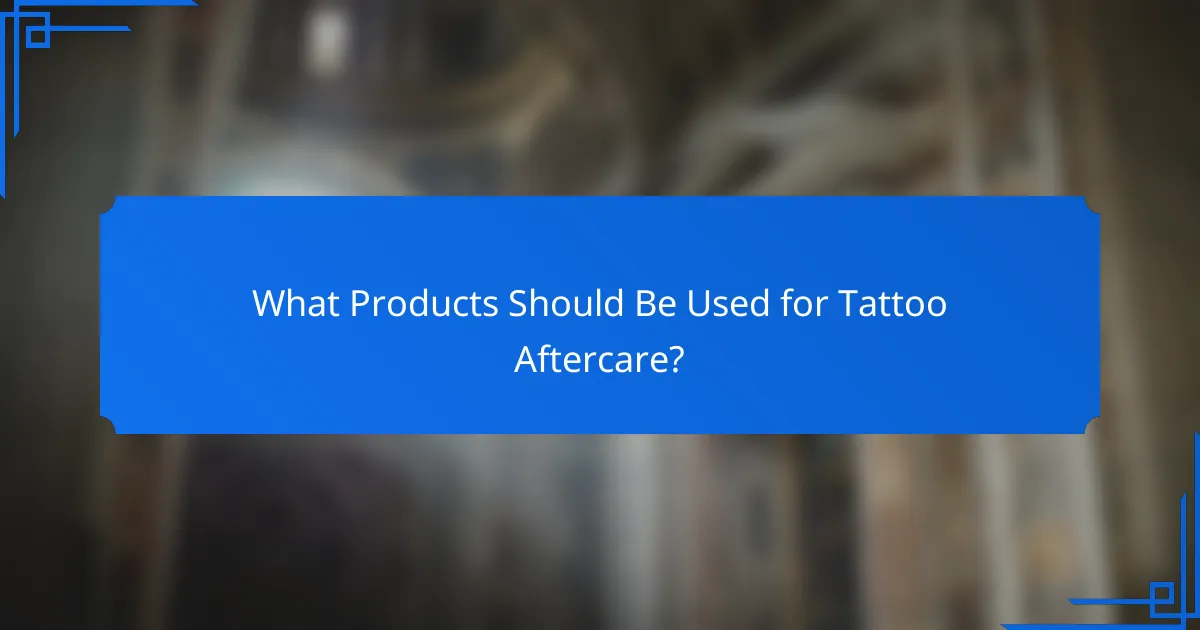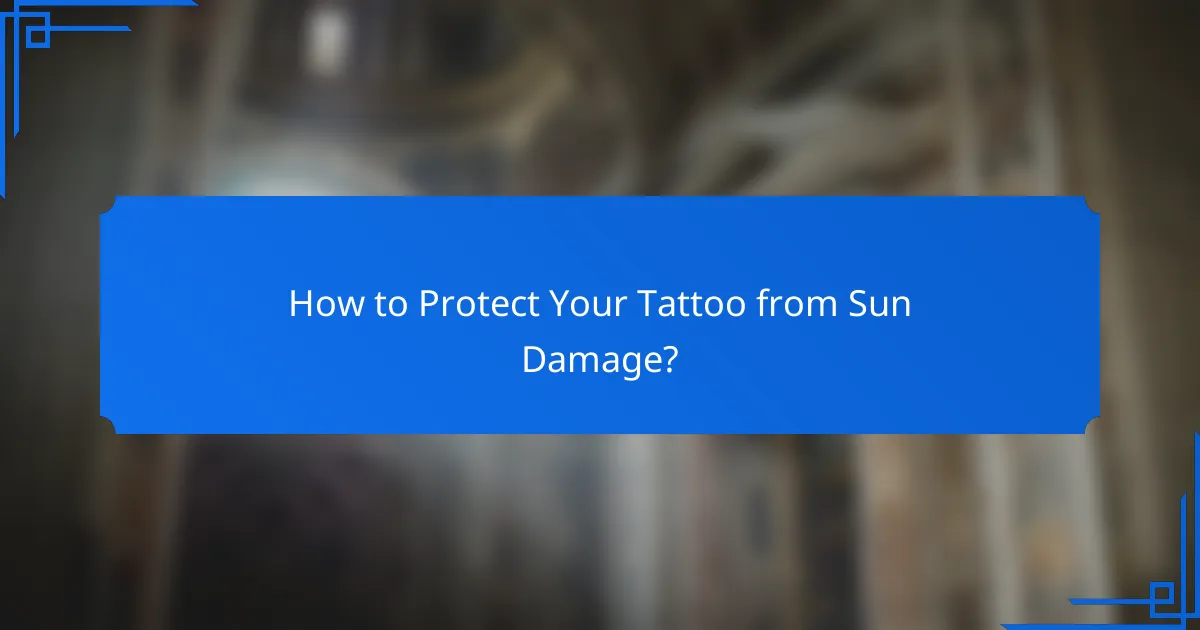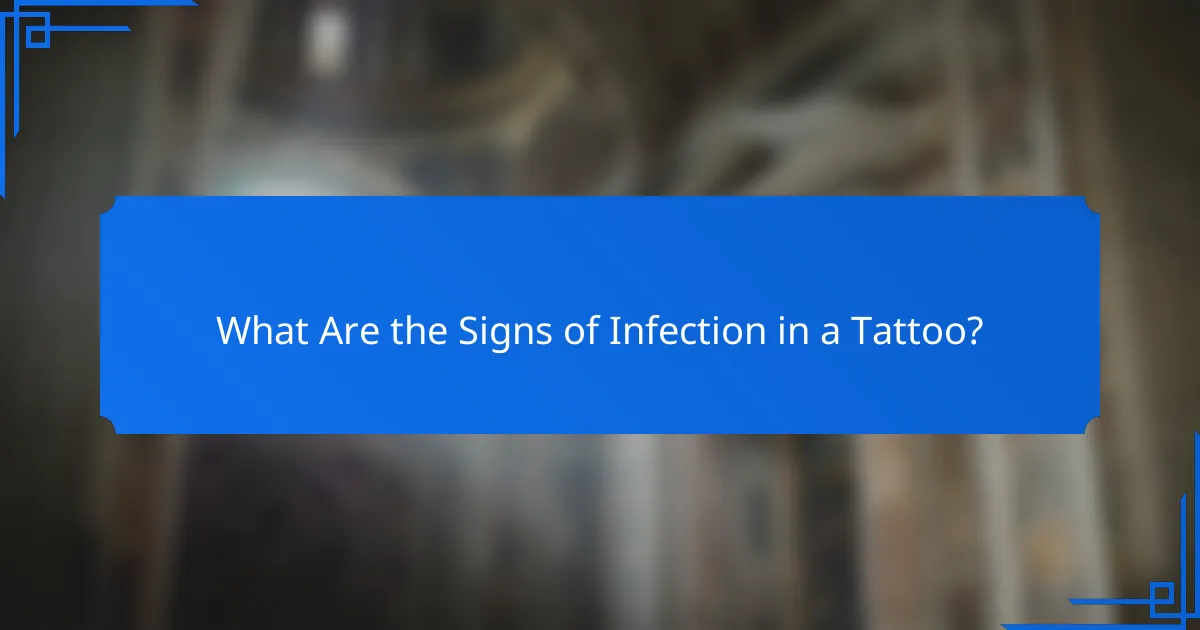Proper tattoo aftercare is vital for ensuring your new ink heals beautifully and lasts for years to come. Avoiding common mistakes can prevent infections, fading, and uneven healing, allowing you to enjoy your tattoo in its best form. By understanding the right cleaning methods and using appropriate products, you can significantly enhance the healing process and maintain the quality of your tattoo.

What Are the Common Mistakes in Tattoo Aftercare?
Common mistakes in tattoo aftercare can lead to infections, faded ink, or uneven healing. Understanding these pitfalls is essential for maintaining the quality and longevity of your tattoo.
Neglecting to clean the tattoo
Failing to clean your tattoo properly can result in infections and complications. It’s crucial to wash the area gently with mild soap and lukewarm water at least twice a day during the healing process.
Use your hands to apply the soap instead of a cloth or sponge, which can harbor bacteria. Pat the tattoo dry with a clean towel, avoiding any rubbing that could irritate the skin.
Over-moisturizing the tattoo
While keeping a tattoo moisturized is important, over-moisturizing can suffocate the skin and lead to issues like clogged pores. Apply a thin layer of fragrance-free lotion or ointment only when necessary, typically 2-3 times a day.
Look for products specifically designed for tattoo aftercare, and avoid using too much product, as this can create a barrier that traps moisture and bacteria.
Exposing the tattoo to sunlight
Sun exposure can cause a tattoo to fade prematurely and increase the risk of sunburn on healing skin. It’s best to keep your tattoo covered with clothing or a bandage during the initial healing phase.
Once healed, always apply a high-SPF sunscreen to protect the tattoo from UV rays, as this will help maintain its vibrancy over time.
Picking at scabs
Picking at scabs can disrupt the healing process and lead to scarring or uneven ink distribution. Allow scabs to fall off naturally; they are a part of the healing process.
If itching occurs, gently tap or pat the area instead of scratching. Keeping the tattoo moisturized can also help reduce itchiness.
Using harsh soaps or chemicals
Harsh soaps or chemicals can irritate the skin and hinder the healing of your tattoo. Stick to gentle, fragrance-free cleansers that are designed for sensitive skin.
Avoid products with alcohol, exfoliants, or strong fragrances, as these can strip the skin of its natural oils and lead to complications. Always read labels to ensure the product is suitable for tattoo aftercare.

How to Properly Clean a New Tattoo?
To properly clean a new tattoo, gently wash it with lukewarm water and a mild soap to remove any blood, ink, or plasma. This process helps prevent infection and promotes healing, ensuring your tattoo looks its best as it heals.
Use lukewarm water and mild soap
When cleaning your new tattoo, always opt for lukewarm water instead of hot or cold, as extreme temperatures can irritate the skin. Use a mild, fragrance-free soap to avoid any harsh chemicals that could affect the healing process.
Gently lather the soap in your hands before applying it to the tattoo. Avoid scrubbing; instead, lightly cleanse the area with your fingertips to prevent damage to the delicate skin.
Pat dry with a clean towel
After washing, it’s crucial to pat your tattoo dry with a clean, soft towel. Rubbing can cause irritation and disrupt the healing skin. Choose a towel that is free from lint to avoid any particles sticking to the tattoo.
Make sure the towel is designated for this purpose to maintain cleanliness. If you prefer, you can also let the tattoo air dry for a few minutes before applying any aftercare products.

What Products Should Be Used for Tattoo Aftercare?
For effective tattoo aftercare, it’s crucial to use products specifically designed to promote healing and prevent infection. The right products can help maintain moisture and protect the tattooed area from irritants.
Fragrance-free moisturizers
Fragrance-free moisturizers are essential for tattoo aftercare as they hydrate the skin without introducing potential irritants. Look for products that contain natural ingredients like aloe vera or shea butter, which can soothe the skin and aid in healing.
When applying a moisturizer, use a thin layer to avoid clogging the pores. Reapply as needed, especially if the skin feels dry or tight. Avoid products with alcohol or strong fragrances, as these can cause irritation and delay healing.
Antibacterial ointments
Antibacterial ointments play a vital role in preventing infections during the initial healing phase of a tattoo. These ointments create a protective barrier over the tattoo, helping to keep bacteria out while the skin heals.
Choose a gentle, non-irritating antibacterial ointment and apply it in a thin layer for the first few days after getting the tattoo. Avoid overusing these products, as excessive application can suffocate the tattoo and lead to complications. Always follow your tattoo artist’s recommendations regarding the duration of use.

How to Protect Your Tattoo from Sun Damage?
To protect your tattoo from sun damage, it is essential to shield it from UV rays, which can cause fading and discoloration. This can be achieved through proper aftercare techniques, including the use of sunscreen and protective clothing.
Apply sunscreen after healing
Once your tattoo has fully healed, applying sunscreen is crucial for maintaining its vibrancy. Choose a broad-spectrum sunscreen with an SPF of at least 30, as this will effectively block harmful UV rays. Reapply every two hours when exposed to the sun, especially during peak hours.
When selecting a sunscreen, consider using a mineral-based option, as these are less likely to irritate sensitive skin. Look for products labeled as “water-resistant” if you plan to swim or sweat, ensuring your tattoo remains protected even in wet conditions.
Wear protective clothing
Wearing protective clothing is another effective way to shield your tattoo from sun damage. Long sleeves, wide-brimmed hats, and UV-blocking fabrics can significantly reduce direct sun exposure. This is particularly important during the first few months after getting your tattoo, when the skin is still healing.
Consider investing in clothing specifically designed for sun protection, which often features UPF ratings. These garments can provide an additional layer of defense, allowing you to enjoy outdoor activities without compromising your tattoo’s appearance.

What Are the Signs of Infection in a Tattoo?
Signs of infection in a tattoo can include increased redness, swelling, and unusual discharge. Recognizing these symptoms early is crucial for effective treatment and to prevent further complications.
Increased redness and swelling
Increased redness and swelling around a tattoo can indicate an infection, especially if it worsens over time. While some redness and swelling are normal during the healing process, persistent or expanding areas of redness may signal a problem.
Monitor the affected area closely. If the redness spreads beyond the tattoo or if the swelling is significant, seek medical advice promptly. A healthcare professional can assess the situation and recommend appropriate treatment.
Pus or unusual discharge
Pus or any unusual discharge from a tattoo site is a strong indicator of infection. Healthy tattoos should not produce any fluid beyond a small amount of clear plasma during the initial healing phase.
If you notice yellow, green, or foul-smelling discharge, it is essential to consult a healthcare provider. These symptoms may require antibiotics or other medical interventions to prevent further complications.

How to Choose the Right Aftercare Products?
Choosing the right aftercare products is essential for promoting healing and maintaining the quality of your tattoo. Look for products that are specifically designed for tattoo care, ensuring they are gentle and free from harmful chemicals.
Look for dermatologist-recommended brands
Dermatologist-recommended brands often prioritize skin health and safety, making them a reliable choice for tattoo aftercare. These products typically undergo rigorous testing to ensure they are effective and non-irritating.
When selecting a product, check for endorsements from dermatologists or skin care professionals. Brands that have a good reputation within the dermatological community often provide formulations that are safe for sensitive skin, which is crucial after getting a tattoo.
Some well-known dermatologist-recommended brands include Aquaphor, Eucerin, and Tattoo Goo. Always read reviews and ingredient lists to confirm that the product aligns with your skin type and tattoo care needs.


